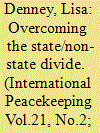| Srl | Item |
| 1 |
ID:
133141


|
|
|
|
|
| Publication |
2014.
|
| Summary/Abstract |
Despite the widely accepted recognition that fragile and conflict-affected countries are characterized by plural security and justice orders, donor-led security and justice programmes continue to engage overwhelmingly with state actors on the basis of liberal peacebuilding models that internalize Weberian understandings of the state. In addition, policies pushing reformers towards engagement with 'informal', 'non-state', or customary systems often do so in a way that suggests a neat separation between the 'state' and 'non-state'. This does not reflect how security and justice operate in practice. This paper uses the case of Sierra Leone to demonstrate the panoply of actors that constitute the plural security and justice context there, and how these actors interact in practice. This reveals the highly interactive nature of the multiple security and justice chains commonly used in Sierra Leone. It is argued that in order to meaningfully engage with the multitudinous ways in which people access security and justice, external reformers need to develop a comprehensive understanding of this complexity. Such an understanding will assist reformers in transcending the increasingly unhelpful state/non-state distinction and in engaging with security and justice from the perspective of the end users, rather than from the perspective of externally derived models.
|
|
|
|
|
|
|
|
|
|
|
|
|
|
|
|
| 2 |
ID:
103721


|
|
|
|
|
| Publication |
2011.
|
| Summary/Abstract |
This article examines the United Kingdom's Department for International Development's understanding of the correlations between security and development at the policy level, and contrasts this with on-the-ground experiences in Sierra Leone. Drawing on fieldwork from Sierra Leone, the article shows how DFID policy appears to have taken the correlation between security and development for granted. As the lead international actor implementing Sierra Leone's security sector reform programme, DFID relies upon the validity of the security-development nexus to justify time, money, and expertise spent on issues of security. The relationship between these phenomena is presented as commonsensical and uncontested, but the specific nature of the relationship has been glossed over, with little real empirical evidence to demonstrate nexus claims. In Sierra Leone newfound security has so far failed to produce the anticipated development, suggesting that the causal link between security and development may not be as straightforward as implied. The article concludes that more precise investigations of the manner in which security and development interact in practice are needed.
|
|
|
|
|
|
|
|
|
|
|
|
|
|
|
|